OB Project: Exploring Emotional Labor, Motivation, and Commitment
VerifiedAdded on 2023/04/20
|12
|2698
|399
Project
AI Summary
This project report delves into the concepts of emotional labor and motivation within organizational behavior, particularly focusing on the hospitality industry. It includes a literature review defining emotional labor and its impact on employees, contrasting deep acting and surface acting strategies. The project incorporates data collected through semi-structured interviews with individuals in various roles, from operational managers to interns, analyzing their experiences and perspectives on job satisfaction, stress management, and organizational support. The analysis identifies participants as either deep actors or surface actors based on their responses, linking these behaviors to potential impacts on mental health and job performance. The report concludes by highlighting the importance of managing emotions in the workplace, fostering a positive environment, and offering recommendations for organizations to support employee well-being and motivation. This assignment solution is available on Desklib, where students can find more resources like past papers and solved assignments.
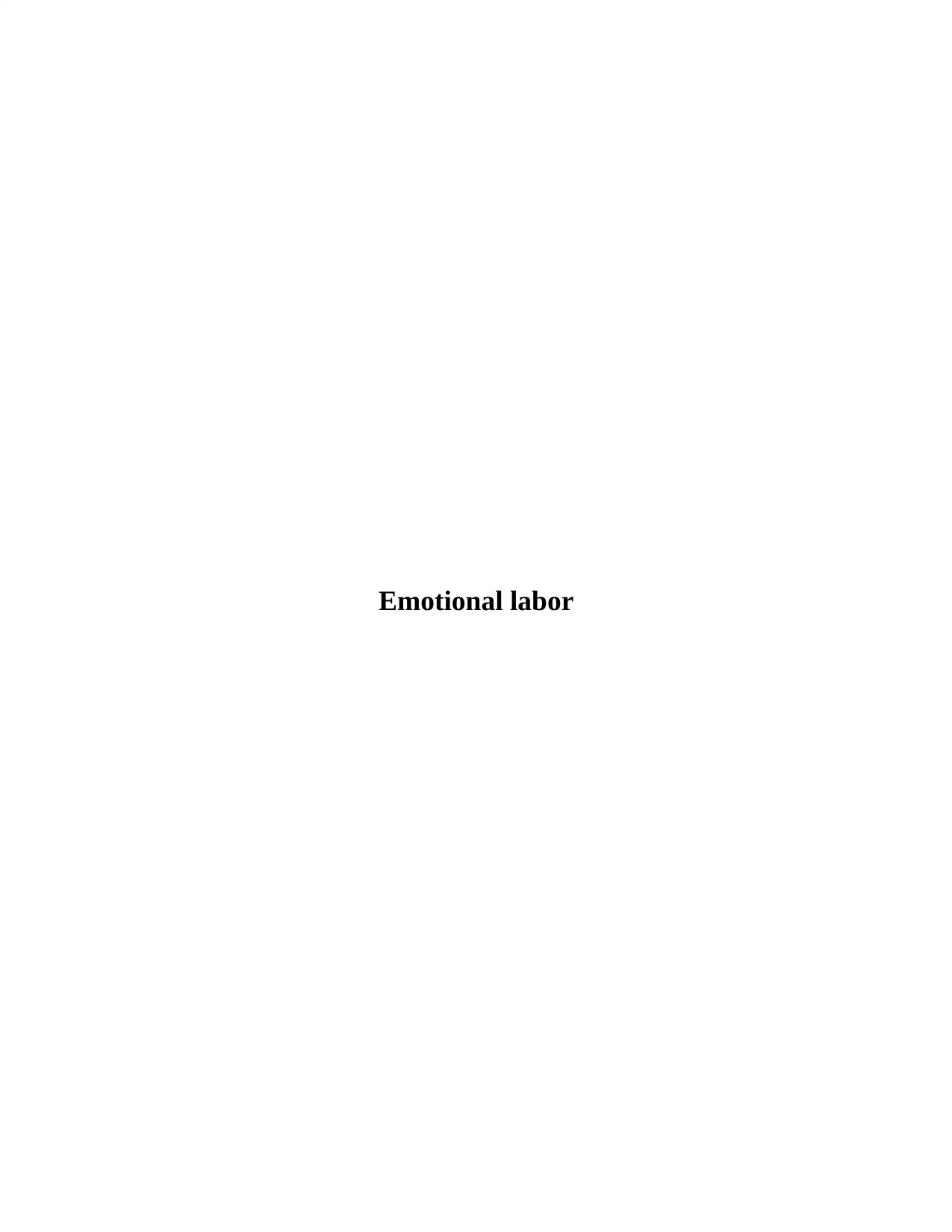
Emotional labor
Paraphrase This Document
Need a fresh take? Get an instant paraphrase of this document with our AI Paraphraser
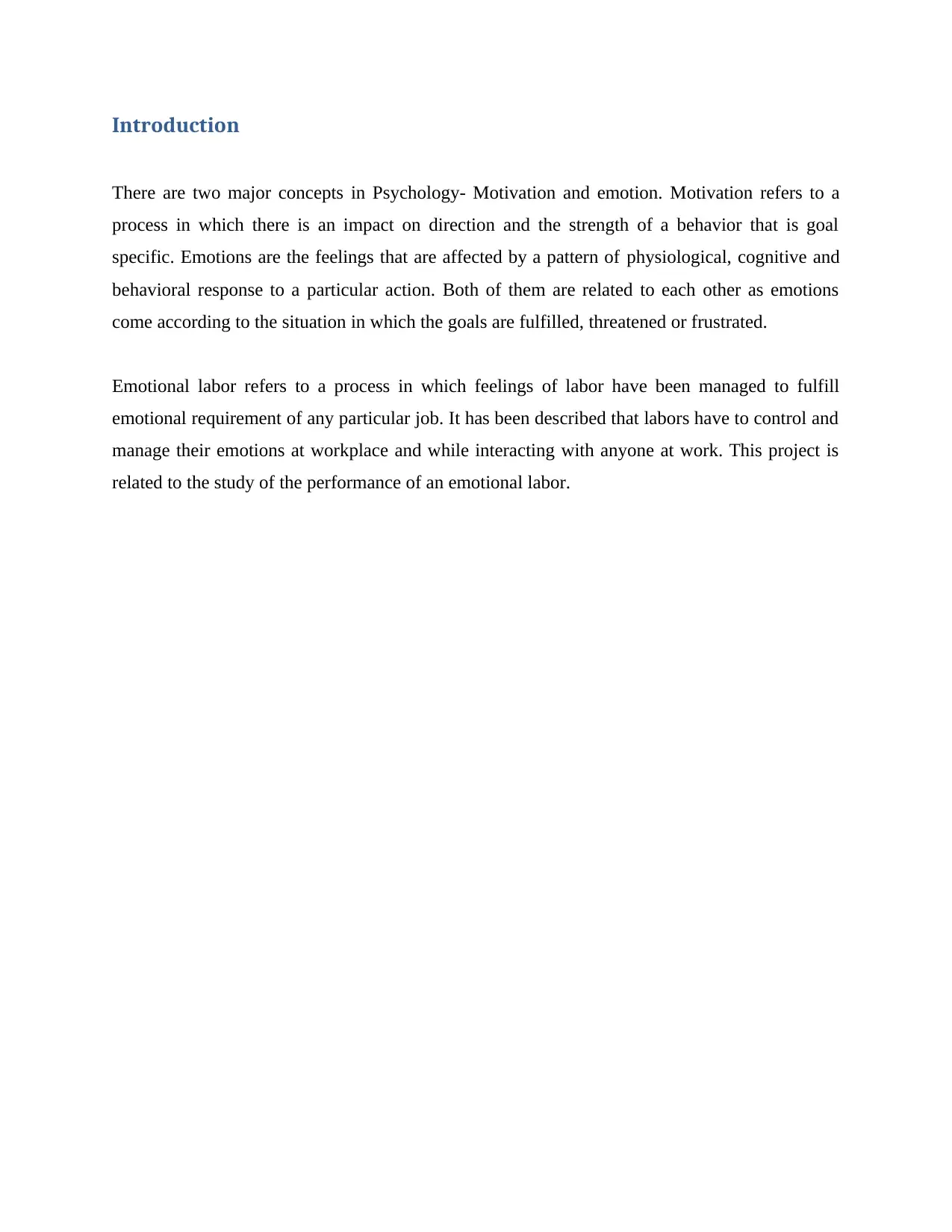
Introduction
There are two major concepts in Psychology- Motivation and emotion. Motivation refers to a
process in which there is an impact on direction and the strength of a behavior that is goal
specific. Emotions are the feelings that are affected by a pattern of physiological, cognitive and
behavioral response to a particular action. Both of them are related to each other as emotions
come according to the situation in which the goals are fulfilled, threatened or frustrated.
Emotional labor refers to a process in which feelings of labor have been managed to fulfill
emotional requirement of any particular job. It has been described that labors have to control and
manage their emotions at workplace and while interacting with anyone at work. This project is
related to the study of the performance of an emotional labor.
There are two major concepts in Psychology- Motivation and emotion. Motivation refers to a
process in which there is an impact on direction and the strength of a behavior that is goal
specific. Emotions are the feelings that are affected by a pattern of physiological, cognitive and
behavioral response to a particular action. Both of them are related to each other as emotions
come according to the situation in which the goals are fulfilled, threatened or frustrated.
Emotional labor refers to a process in which feelings of labor have been managed to fulfill
emotional requirement of any particular job. It has been described that labors have to control and
manage their emotions at workplace and while interacting with anyone at work. This project is
related to the study of the performance of an emotional labor.
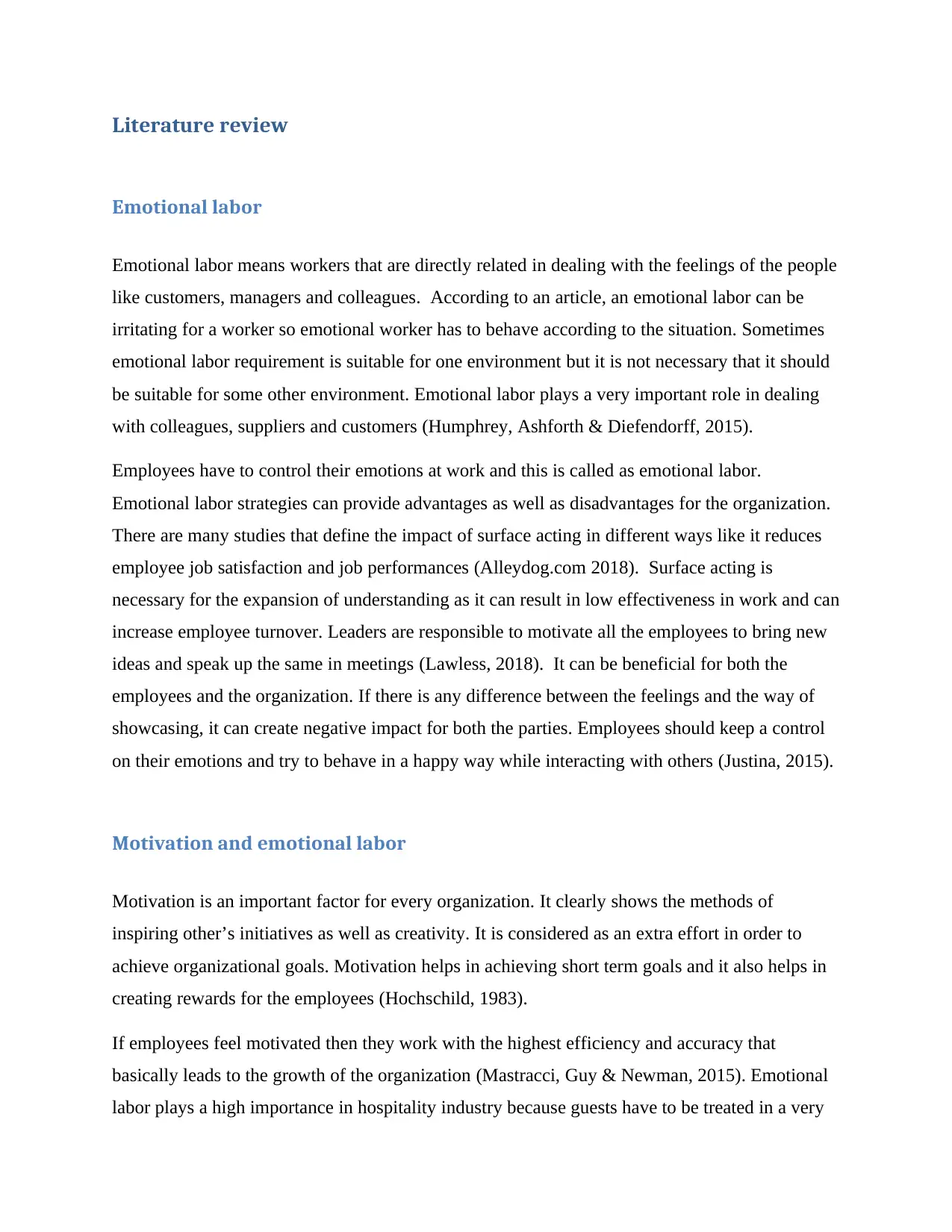
Literature review
Emotional labor
Emotional labor means workers that are directly related in dealing with the feelings of the people
like customers, managers and colleagues. According to an article, an emotional labor can be
irritating for a worker so emotional worker has to behave according to the situation. Sometimes
emotional labor requirement is suitable for one environment but it is not necessary that it should
be suitable for some other environment. Emotional labor plays a very important role in dealing
with colleagues, suppliers and customers (Humphrey, Ashforth & Diefendorff, 2015).
Employees have to control their emotions at work and this is called as emotional labor.
Emotional labor strategies can provide advantages as well as disadvantages for the organization.
There are many studies that define the impact of surface acting in different ways like it reduces
employee job satisfaction and job performances (Alleydog.com 2018). Surface acting is
necessary for the expansion of understanding as it can result in low effectiveness in work and can
increase employee turnover. Leaders are responsible to motivate all the employees to bring new
ideas and speak up the same in meetings (Lawless, 2018). It can be beneficial for both the
employees and the organization. If there is any difference between the feelings and the way of
showcasing, it can create negative impact for both the parties. Employees should keep a control
on their emotions and try to behave in a happy way while interacting with others (Justina, 2015).
Motivation and emotional labor
Motivation is an important factor for every organization. It clearly shows the methods of
inspiring other’s initiatives as well as creativity. It is considered as an extra effort in order to
achieve organizational goals. Motivation helps in achieving short term goals and it also helps in
creating rewards for the employees (Hochschild, 1983).
If employees feel motivated then they work with the highest efficiency and accuracy that
basically leads to the growth of the organization (Mastracci, Guy & Newman, 2015). Emotional
labor plays a high importance in hospitality industry because guests have to be treated in a very
Emotional labor
Emotional labor means workers that are directly related in dealing with the feelings of the people
like customers, managers and colleagues. According to an article, an emotional labor can be
irritating for a worker so emotional worker has to behave according to the situation. Sometimes
emotional labor requirement is suitable for one environment but it is not necessary that it should
be suitable for some other environment. Emotional labor plays a very important role in dealing
with colleagues, suppliers and customers (Humphrey, Ashforth & Diefendorff, 2015).
Employees have to control their emotions at work and this is called as emotional labor.
Emotional labor strategies can provide advantages as well as disadvantages for the organization.
There are many studies that define the impact of surface acting in different ways like it reduces
employee job satisfaction and job performances (Alleydog.com 2018). Surface acting is
necessary for the expansion of understanding as it can result in low effectiveness in work and can
increase employee turnover. Leaders are responsible to motivate all the employees to bring new
ideas and speak up the same in meetings (Lawless, 2018). It can be beneficial for both the
employees and the organization. If there is any difference between the feelings and the way of
showcasing, it can create negative impact for both the parties. Employees should keep a control
on their emotions and try to behave in a happy way while interacting with others (Justina, 2015).
Motivation and emotional labor
Motivation is an important factor for every organization. It clearly shows the methods of
inspiring other’s initiatives as well as creativity. It is considered as an extra effort in order to
achieve organizational goals. Motivation helps in achieving short term goals and it also helps in
creating rewards for the employees (Hochschild, 1983).
If employees feel motivated then they work with the highest efficiency and accuracy that
basically leads to the growth of the organization (Mastracci, Guy & Newman, 2015). Emotional
labor plays a high importance in hospitality industry because guests have to be treated in a very
⊘ This is a preview!⊘
Do you want full access?
Subscribe today to unlock all pages.

Trusted by 1+ million students worldwide
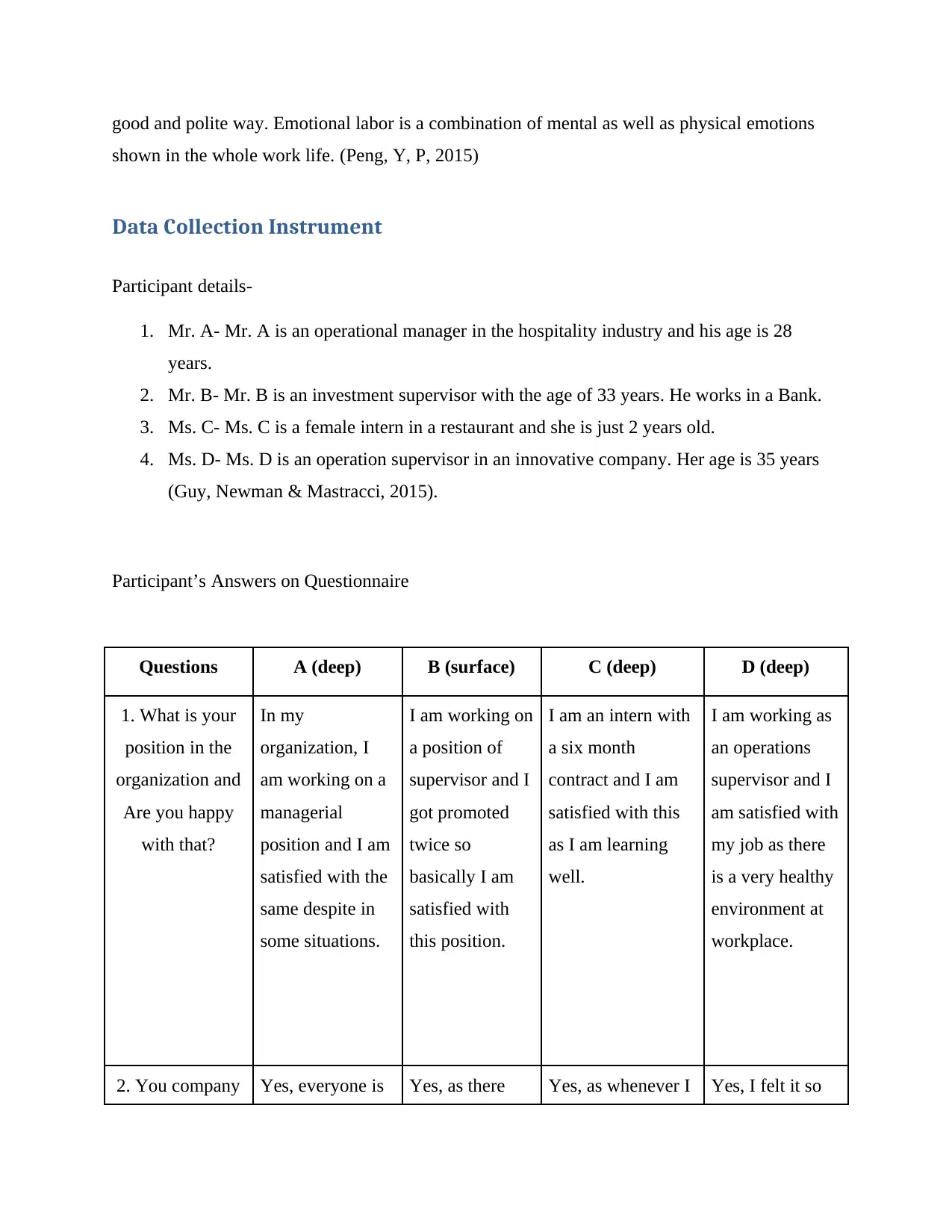
good and polite way. Emotional labor is a combination of mental as well as physical emotions
shown in the whole work life. (Peng, Y, P, 2015)
Data Collection Instrument
Participant details-
1. Mr. A- Mr. A is an operational manager in the hospitality industry and his age is 28
years.
2. Mr. B- Mr. B is an investment supervisor with the age of 33 years. He works in a Bank.
3. Ms. C- Ms. C is a female intern in a restaurant and she is just 2 years old.
4. Ms. D- Ms. D is an operation supervisor in an innovative company. Her age is 35 years
(Guy, Newman & Mastracci, 2015).
Participant’s Answers on Questionnaire
Questions A (deep) B (surface) C (deep) D (deep)
1. What is your
position in the
organization and
Are you happy
with that?
In my
organization, I
am working on a
managerial
position and I am
satisfied with the
same despite in
some situations.
I am working on
a position of
supervisor and I
got promoted
twice so
basically I am
satisfied with
this position.
I am an intern with
a six month
contract and I am
satisfied with this
as I am learning
well.
I am working as
an operations
supervisor and I
am satisfied with
my job as there
is a very healthy
environment at
workplace.
2. You company Yes, everyone is Yes, as there Yes, as whenever I Yes, I felt it so
shown in the whole work life. (Peng, Y, P, 2015)
Data Collection Instrument
Participant details-
1. Mr. A- Mr. A is an operational manager in the hospitality industry and his age is 28
years.
2. Mr. B- Mr. B is an investment supervisor with the age of 33 years. He works in a Bank.
3. Ms. C- Ms. C is a female intern in a restaurant and she is just 2 years old.
4. Ms. D- Ms. D is an operation supervisor in an innovative company. Her age is 35 years
(Guy, Newman & Mastracci, 2015).
Participant’s Answers on Questionnaire
Questions A (deep) B (surface) C (deep) D (deep)
1. What is your
position in the
organization and
Are you happy
with that?
In my
organization, I
am working on a
managerial
position and I am
satisfied with the
same despite in
some situations.
I am working on
a position of
supervisor and I
got promoted
twice so
basically I am
satisfied with
this position.
I am an intern with
a six month
contract and I am
satisfied with this
as I am learning
well.
I am working as
an operations
supervisor and I
am satisfied with
my job as there
is a very healthy
environment at
workplace.
2. You company Yes, everyone is Yes, as there Yes, as whenever I Yes, I felt it so
Paraphrase This Document
Need a fresh take? Get an instant paraphrase of this document with our AI Paraphraser
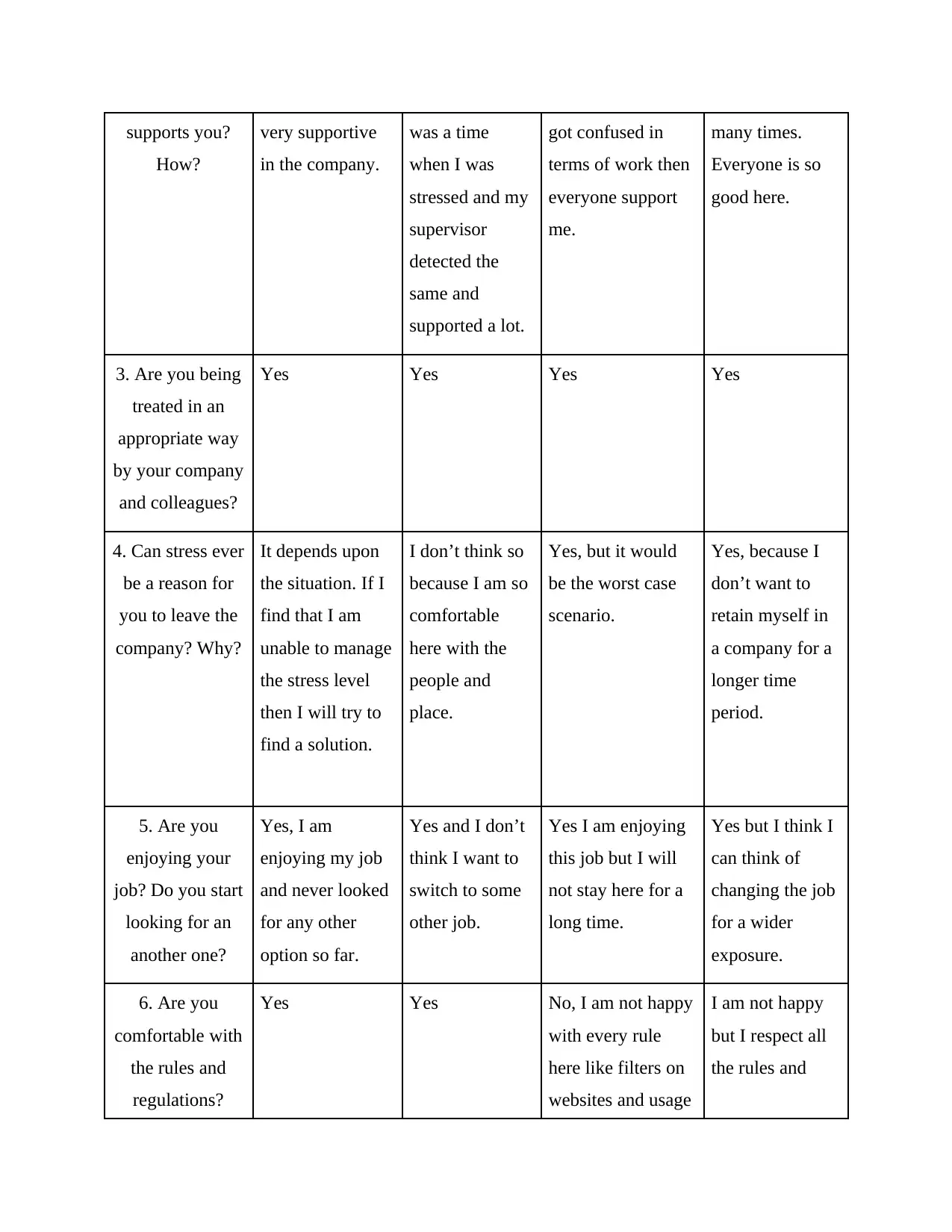
supports you?
How?
very supportive
in the company.
was a time
when I was
stressed and my
supervisor
detected the
same and
supported a lot.
got confused in
terms of work then
everyone support
me.
many times.
Everyone is so
good here.
3. Are you being
treated in an
appropriate way
by your company
and colleagues?
Yes Yes Yes Yes
4. Can stress ever
be a reason for
you to leave the
company? Why?
It depends upon
the situation. If I
find that I am
unable to manage
the stress level
then I will try to
find a solution.
I don’t think so
because I am so
comfortable
here with the
people and
place.
Yes, but it would
be the worst case
scenario.
Yes, because I
don’t want to
retain myself in
a company for a
longer time
period.
5. Are you
enjoying your
job? Do you start
looking for an
another one?
Yes, I am
enjoying my job
and never looked
for any other
option so far.
Yes and I don’t
think I want to
switch to some
other job.
Yes I am enjoying
this job but I will
not stay here for a
long time.
Yes but I think I
can think of
changing the job
for a wider
exposure.
6. Are you
comfortable with
the rules and
regulations?
Yes Yes No, I am not happy
with every rule
here like filters on
websites and usage
I am not happy
but I respect all
the rules and
How?
very supportive
in the company.
was a time
when I was
stressed and my
supervisor
detected the
same and
supported a lot.
got confused in
terms of work then
everyone support
me.
many times.
Everyone is so
good here.
3. Are you being
treated in an
appropriate way
by your company
and colleagues?
Yes Yes Yes Yes
4. Can stress ever
be a reason for
you to leave the
company? Why?
It depends upon
the situation. If I
find that I am
unable to manage
the stress level
then I will try to
find a solution.
I don’t think so
because I am so
comfortable
here with the
people and
place.
Yes, but it would
be the worst case
scenario.
Yes, because I
don’t want to
retain myself in
a company for a
longer time
period.
5. Are you
enjoying your
job? Do you start
looking for an
another one?
Yes, I am
enjoying my job
and never looked
for any other
option so far.
Yes and I don’t
think I want to
switch to some
other job.
Yes I am enjoying
this job but I will
not stay here for a
long time.
Yes but I think I
can think of
changing the job
for a wider
exposure.
6. Are you
comfortable with
the rules and
regulations?
Yes Yes No, I am not happy
with every rule
here like filters on
websites and usage
I am not happy
but I respect all
the rules and
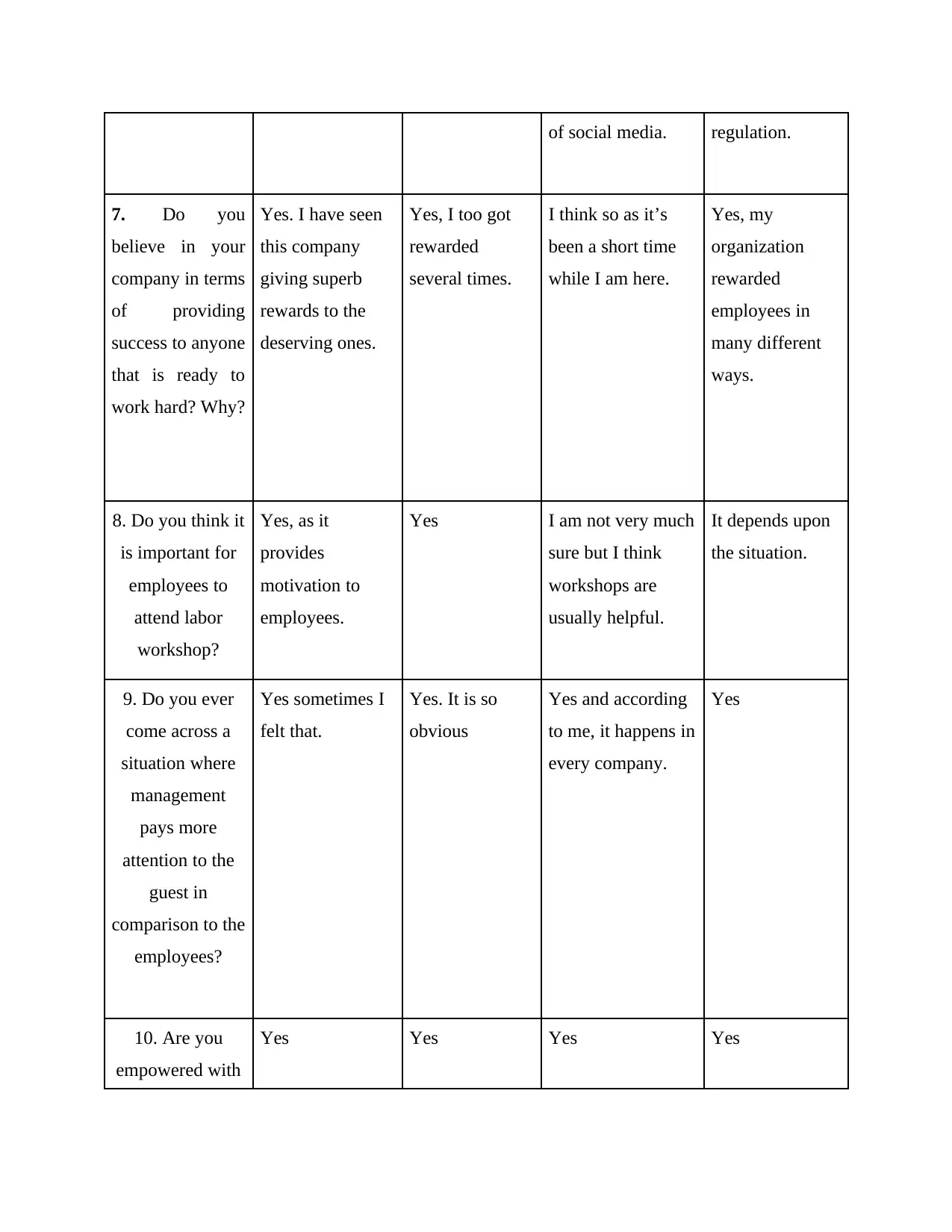
of social media. regulation.
7. Do you
believe in your
company in terms
of providing
success to anyone
that is ready to
work hard? Why?
Yes. I have seen
this company
giving superb
rewards to the
deserving ones.
Yes, I too got
rewarded
several times.
I think so as it’s
been a short time
while I am here.
Yes, my
organization
rewarded
employees in
many different
ways.
8. Do you think it
is important for
employees to
attend labor
workshop?
Yes, as it
provides
motivation to
employees.
Yes I am not very much
sure but I think
workshops are
usually helpful.
It depends upon
the situation.
9. Do you ever
come across a
situation where
management
pays more
attention to the
guest in
comparison to the
employees?
Yes sometimes I
felt that.
Yes. It is so
obvious
Yes and according
to me, it happens in
every company.
Yes
10. Are you
empowered with
Yes Yes Yes Yes
7. Do you
believe in your
company in terms
of providing
success to anyone
that is ready to
work hard? Why?
Yes. I have seen
this company
giving superb
rewards to the
deserving ones.
Yes, I too got
rewarded
several times.
I think so as it’s
been a short time
while I am here.
Yes, my
organization
rewarded
employees in
many different
ways.
8. Do you think it
is important for
employees to
attend labor
workshop?
Yes, as it
provides
motivation to
employees.
Yes I am not very much
sure but I think
workshops are
usually helpful.
It depends upon
the situation.
9. Do you ever
come across a
situation where
management
pays more
attention to the
guest in
comparison to the
employees?
Yes sometimes I
felt that.
Yes. It is so
obvious
Yes and according
to me, it happens in
every company.
Yes
10. Are you
empowered with
Yes Yes Yes Yes
⊘ This is a preview!⊘
Do you want full access?
Subscribe today to unlock all pages.

Trusted by 1+ million students worldwide
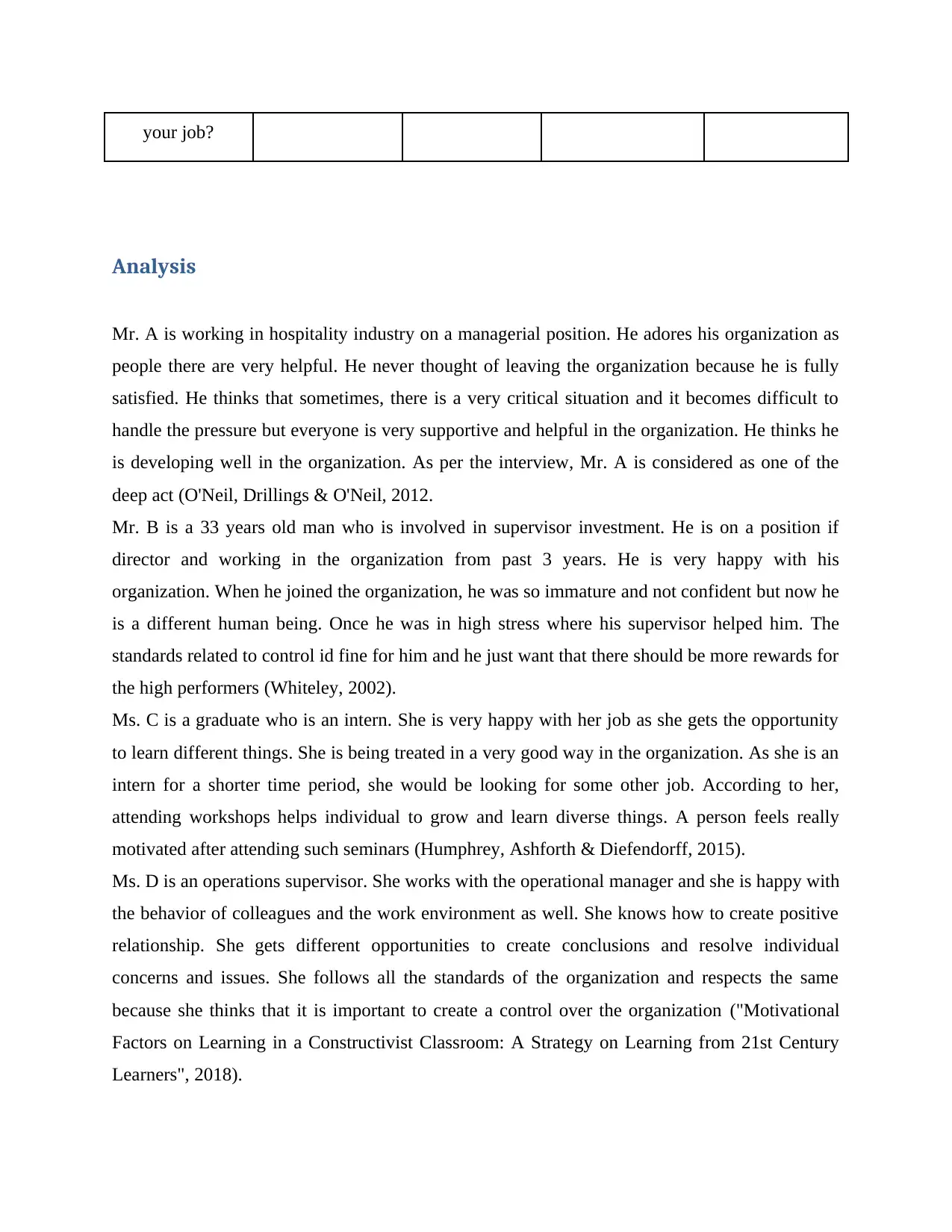
your job?
Analysis
Mr. A is working in hospitality industry on a managerial position. He adores his organization as
people there are very helpful. He never thought of leaving the organization because he is fully
satisfied. He thinks that sometimes, there is a very critical situation and it becomes difficult to
handle the pressure but everyone is very supportive and helpful in the organization. He thinks he
is developing well in the organization. As per the interview, Mr. A is considered as one of the
deep act (O'Neil, Drillings & O'Neil, 2012.
Mr. B is a 33 years old man who is involved in supervisor investment. He is on a position if
director and working in the organization from past 3 years. He is very happy with his
organization. When he joined the organization, he was so immature and not confident but now he
is a different human being. Once he was in high stress where his supervisor helped him. The
standards related to control id fine for him and he just want that there should be more rewards for
the high performers (Whiteley, 2002).
Ms. C is a graduate who is an intern. She is very happy with her job as she gets the opportunity
to learn different things. She is being treated in a very good way in the organization. As she is an
intern for a shorter time period, she would be looking for some other job. According to her,
attending workshops helps individual to grow and learn diverse things. A person feels really
motivated after attending such seminars (Humphrey, Ashforth & Diefendorff, 2015).
Ms. D is an operations supervisor. She works with the operational manager and she is happy with
the behavior of colleagues and the work environment as well. She knows how to create positive
relationship. She gets different opportunities to create conclusions and resolve individual
concerns and issues. She follows all the standards of the organization and respects the same
because she thinks that it is important to create a control over the organization ("Motivational
Factors on Learning in a Constructivist Classroom: A Strategy on Learning from 21st Century
Learners", 2018).
Analysis
Mr. A is working in hospitality industry on a managerial position. He adores his organization as
people there are very helpful. He never thought of leaving the organization because he is fully
satisfied. He thinks that sometimes, there is a very critical situation and it becomes difficult to
handle the pressure but everyone is very supportive and helpful in the organization. He thinks he
is developing well in the organization. As per the interview, Mr. A is considered as one of the
deep act (O'Neil, Drillings & O'Neil, 2012.
Mr. B is a 33 years old man who is involved in supervisor investment. He is on a position if
director and working in the organization from past 3 years. He is very happy with his
organization. When he joined the organization, he was so immature and not confident but now he
is a different human being. Once he was in high stress where his supervisor helped him. The
standards related to control id fine for him and he just want that there should be more rewards for
the high performers (Whiteley, 2002).
Ms. C is a graduate who is an intern. She is very happy with her job as she gets the opportunity
to learn different things. She is being treated in a very good way in the organization. As she is an
intern for a shorter time period, she would be looking for some other job. According to her,
attending workshops helps individual to grow and learn diverse things. A person feels really
motivated after attending such seminars (Humphrey, Ashforth & Diefendorff, 2015).
Ms. D is an operations supervisor. She works with the operational manager and she is happy with
the behavior of colleagues and the work environment as well. She knows how to create positive
relationship. She gets different opportunities to create conclusions and resolve individual
concerns and issues. She follows all the standards of the organization and respects the same
because she thinks that it is important to create a control over the organization ("Motivational
Factors on Learning in a Constructivist Classroom: A Strategy on Learning from 21st Century
Learners", 2018).
Paraphrase This Document
Need a fresh take? Get an instant paraphrase of this document with our AI Paraphraser
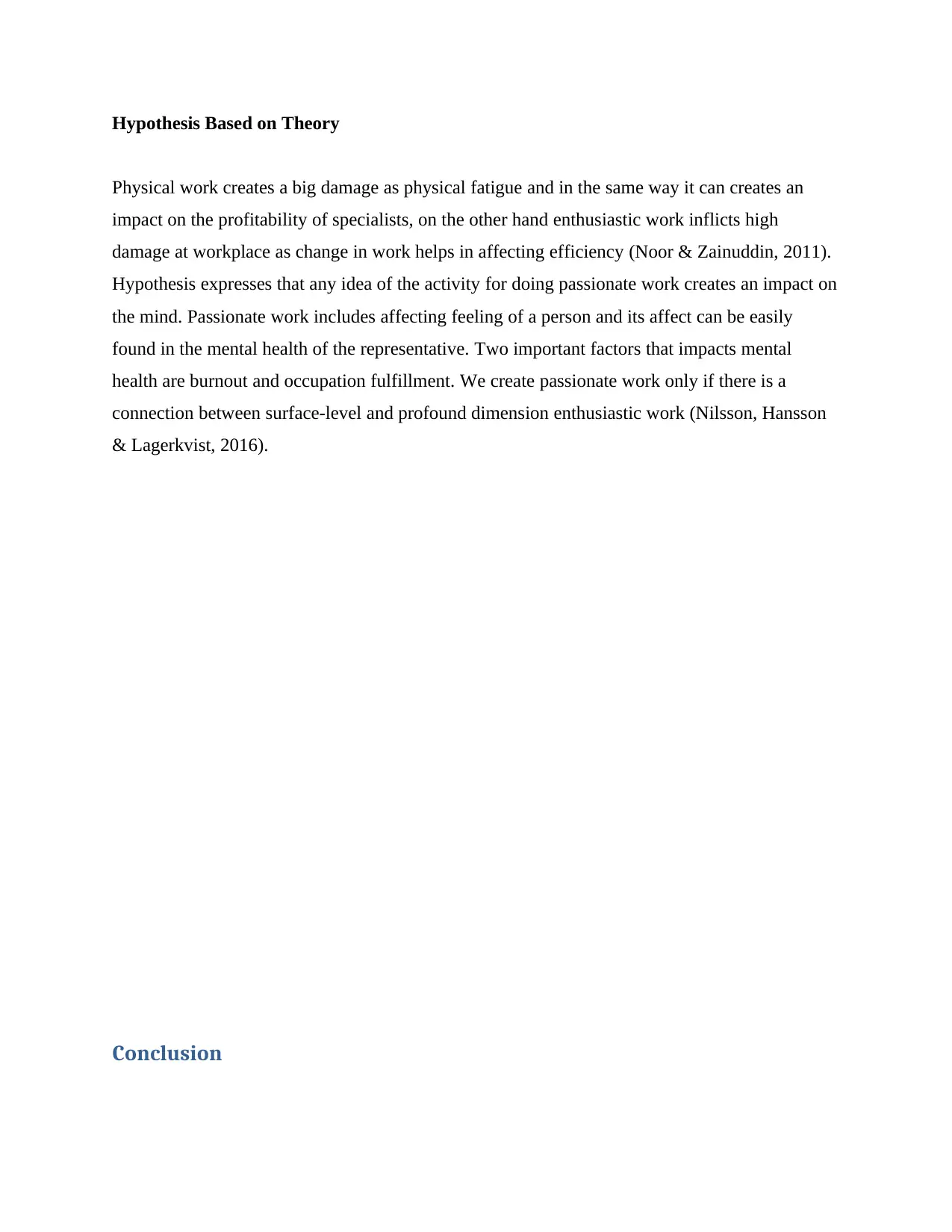
Hypothesis Based on Theory
Physical work creates a big damage as physical fatigue and in the same way it can creates an
impact on the profitability of specialists, on the other hand enthusiastic work inflicts high
damage at workplace as change in work helps in affecting efficiency (Noor & Zainuddin, 2011).
Hypothesis expresses that any idea of the activity for doing passionate work creates an impact on
the mind. Passionate work includes affecting feeling of a person and its affect can be easily
found in the mental health of the representative. Two important factors that impacts mental
health are burnout and occupation fulfillment. We create passionate work only if there is a
connection between surface-level and profound dimension enthusiastic work (Nilsson, Hansson
& Lagerkvist, 2016).
Conclusion
Physical work creates a big damage as physical fatigue and in the same way it can creates an
impact on the profitability of specialists, on the other hand enthusiastic work inflicts high
damage at workplace as change in work helps in affecting efficiency (Noor & Zainuddin, 2011).
Hypothesis expresses that any idea of the activity for doing passionate work creates an impact on
the mind. Passionate work includes affecting feeling of a person and its affect can be easily
found in the mental health of the representative. Two important factors that impacts mental
health are burnout and occupation fulfillment. We create passionate work only if there is a
connection between surface-level and profound dimension enthusiastic work (Nilsson, Hansson
& Lagerkvist, 2016).
Conclusion
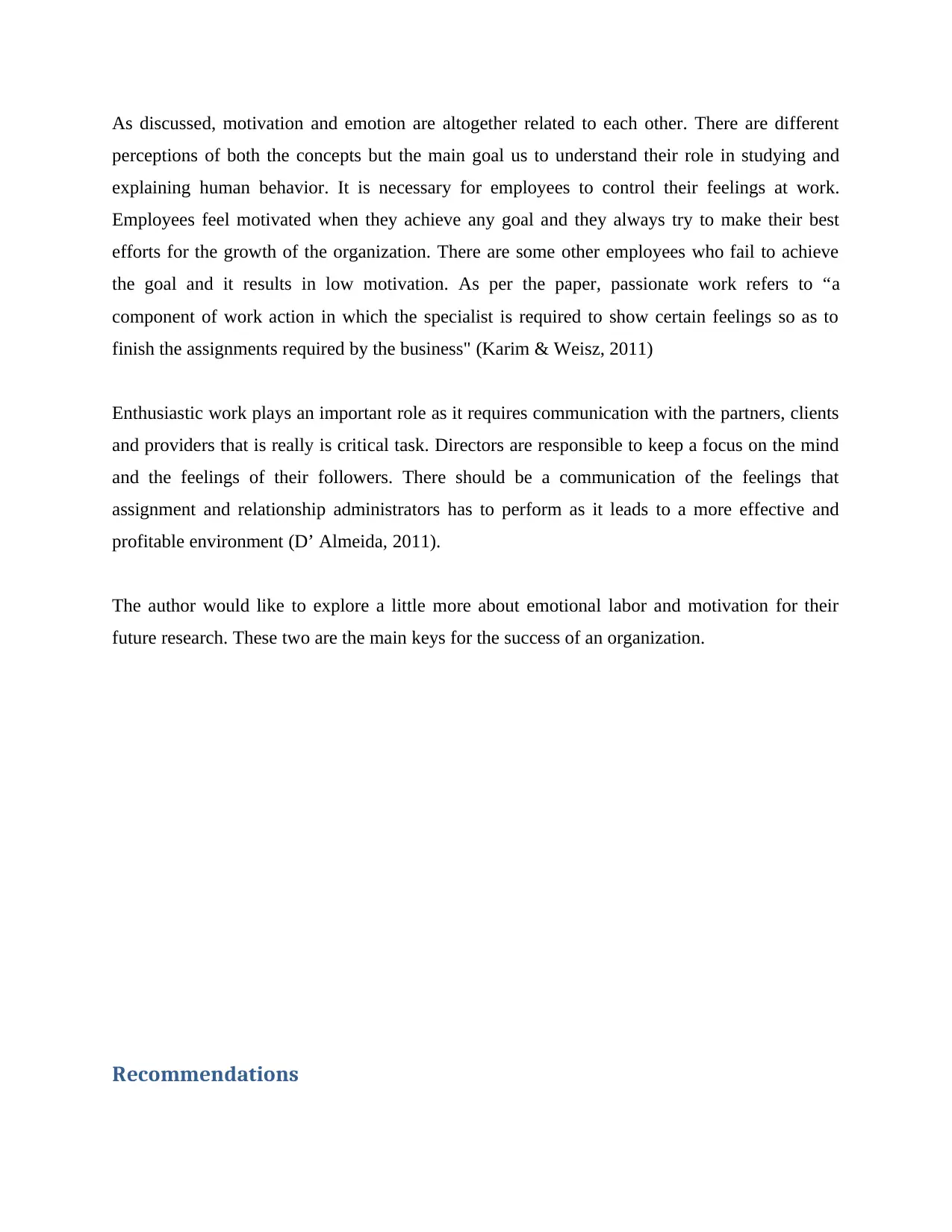
As discussed, motivation and emotion are altogether related to each other. There are different
perceptions of both the concepts but the main goal us to understand their role in studying and
explaining human behavior. It is necessary for employees to control their feelings at work.
Employees feel motivated when they achieve any goal and they always try to make their best
efforts for the growth of the organization. There are some other employees who fail to achieve
the goal and it results in low motivation. As per the paper, passionate work refers to “a
component of work action in which the specialist is required to show certain feelings so as to
finish the assignments required by the business" (Karim & Weisz, 2011)
Enthusiastic work plays an important role as it requires communication with the partners, clients
and providers that is really is critical task. Directors are responsible to keep a focus on the mind
and the feelings of their followers. There should be a communication of the feelings that
assignment and relationship administrators has to perform as it leads to a more effective and
profitable environment (D’ Almeida, 2011).
The author would like to explore a little more about emotional labor and motivation for their
future research. These two are the main keys for the success of an organization.
Recommendations
perceptions of both the concepts but the main goal us to understand their role in studying and
explaining human behavior. It is necessary for employees to control their feelings at work.
Employees feel motivated when they achieve any goal and they always try to make their best
efforts for the growth of the organization. There are some other employees who fail to achieve
the goal and it results in low motivation. As per the paper, passionate work refers to “a
component of work action in which the specialist is required to show certain feelings so as to
finish the assignments required by the business" (Karim & Weisz, 2011)
Enthusiastic work plays an important role as it requires communication with the partners, clients
and providers that is really is critical task. Directors are responsible to keep a focus on the mind
and the feelings of their followers. There should be a communication of the feelings that
assignment and relationship administrators has to perform as it leads to a more effective and
profitable environment (D’ Almeida, 2011).
The author would like to explore a little more about emotional labor and motivation for their
future research. These two are the main keys for the success of an organization.
Recommendations
⊘ This is a preview!⊘
Do you want full access?
Subscribe today to unlock all pages.

Trusted by 1+ million students worldwide
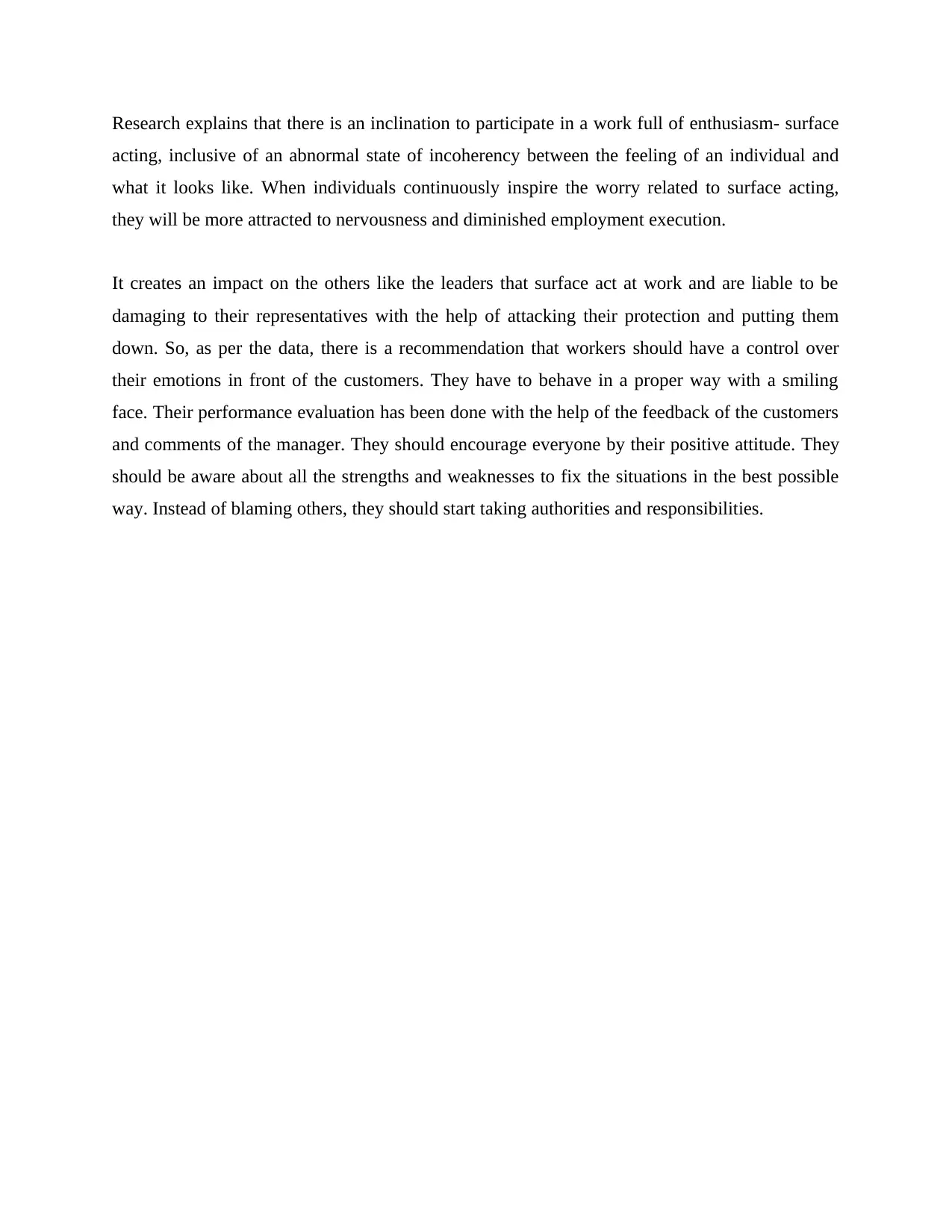
Research explains that there is an inclination to participate in a work full of enthusiasm- surface
acting, inclusive of an abnormal state of incoherency between the feeling of an individual and
what it looks like. When individuals continuously inspire the worry related to surface acting,
they will be more attracted to nervousness and diminished employment execution.
It creates an impact on the others like the leaders that surface act at work and are liable to be
damaging to their representatives with the help of attacking their protection and putting them
down. So, as per the data, there is a recommendation that workers should have a control over
their emotions in front of the customers. They have to behave in a proper way with a smiling
face. Their performance evaluation has been done with the help of the feedback of the customers
and comments of the manager. They should encourage everyone by their positive attitude. They
should be aware about all the strengths and weaknesses to fix the situations in the best possible
way. Instead of blaming others, they should start taking authorities and responsibilities.
acting, inclusive of an abnormal state of incoherency between the feeling of an individual and
what it looks like. When individuals continuously inspire the worry related to surface acting,
they will be more attracted to nervousness and diminished employment execution.
It creates an impact on the others like the leaders that surface act at work and are liable to be
damaging to their representatives with the help of attacking their protection and putting them
down. So, as per the data, there is a recommendation that workers should have a control over
their emotions in front of the customers. They have to behave in a proper way with a smiling
face. Their performance evaluation has been done with the help of the feedback of the customers
and comments of the manager. They should encourage everyone by their positive attitude. They
should be aware about all the strengths and weaknesses to fix the situations in the best possible
way. Instead of blaming others, they should start taking authorities and responsibilities.
Paraphrase This Document
Need a fresh take? Get an instant paraphrase of this document with our AI Paraphraser
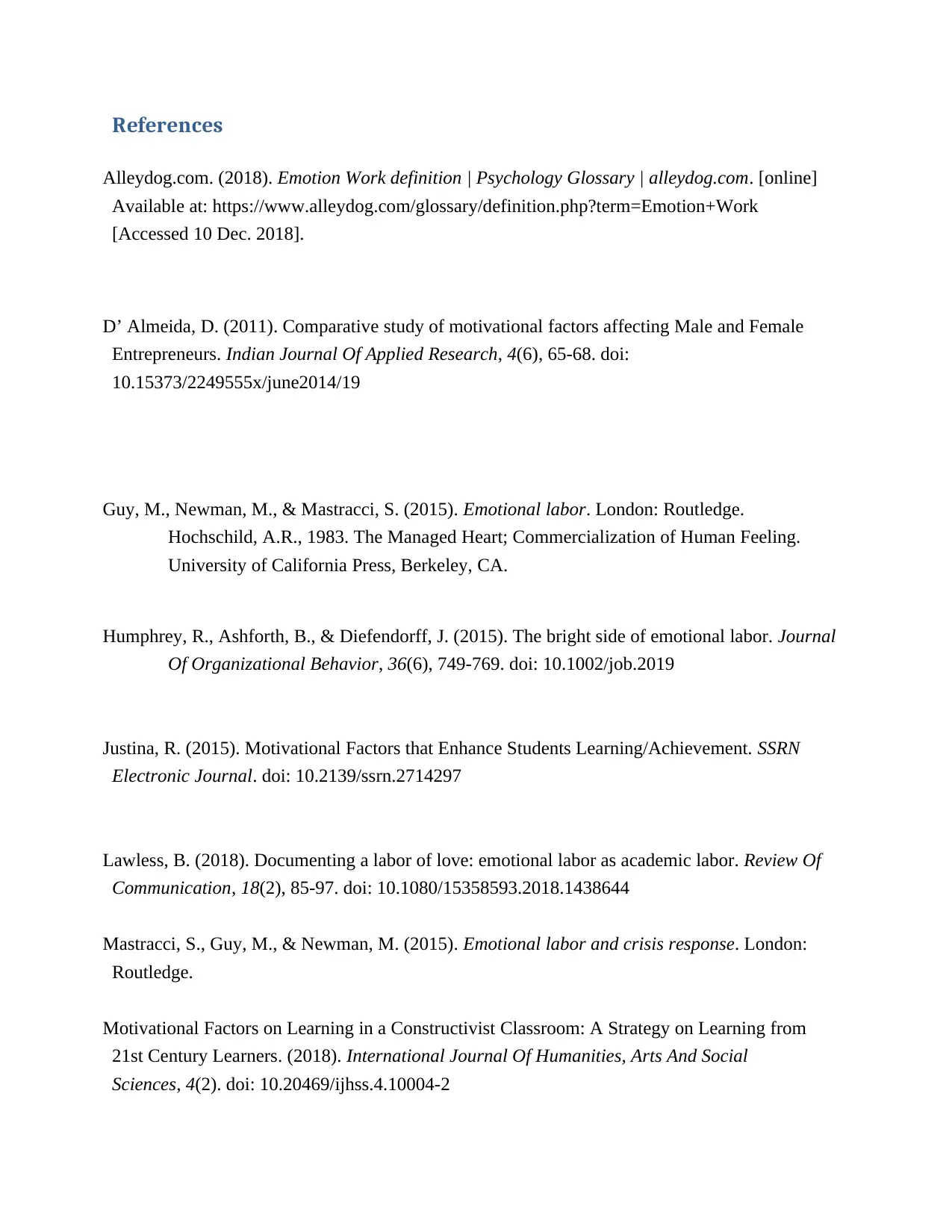
References
Alleydog.com. (2018). Emotion Work definition | Psychology Glossary | alleydog.com. [online]
Available at: https://www.alleydog.com/glossary/definition.php?term=Emotion+Work
[Accessed 10 Dec. 2018].
D’ Almeida, D. (2011). Comparative study of motivational factors affecting Male and Female
Entrepreneurs. Indian Journal Of Applied Research, 4(6), 65-68. doi:
10.15373/2249555x/june2014/19
Guy, M., Newman, M., & Mastracci, S. (2015). Emotional labor. London: Routledge.
Hochschild, A.R., 1983. The Managed Heart; Commercialization of Human Feeling.
University of California Press, Berkeley, CA.
Humphrey, R., Ashforth, B., & Diefendorff, J. (2015). The bright side of emotional labor. Journal
Of Organizational Behavior, 36(6), 749-769. doi: 10.1002/job.2019
Justina, R. (2015). Motivational Factors that Enhance Students Learning/Achievement. SSRN
Electronic Journal. doi: 10.2139/ssrn.2714297
Lawless, B. (2018). Documenting a labor of love: emotional labor as academic labor. Review Of
Communication, 18(2), 85-97. doi: 10.1080/15358593.2018.1438644
Mastracci, S., Guy, M., & Newman, M. (2015). Emotional labor and crisis response. London:
Routledge.
Motivational Factors on Learning in a Constructivist Classroom: A Strategy on Learning from
21st Century Learners. (2018). International Journal Of Humanities, Arts And Social
Sciences, 4(2). doi: 10.20469/ijhss.4.10004-2
Alleydog.com. (2018). Emotion Work definition | Psychology Glossary | alleydog.com. [online]
Available at: https://www.alleydog.com/glossary/definition.php?term=Emotion+Work
[Accessed 10 Dec. 2018].
D’ Almeida, D. (2011). Comparative study of motivational factors affecting Male and Female
Entrepreneurs. Indian Journal Of Applied Research, 4(6), 65-68. doi:
10.15373/2249555x/june2014/19
Guy, M., Newman, M., & Mastracci, S. (2015). Emotional labor. London: Routledge.
Hochschild, A.R., 1983. The Managed Heart; Commercialization of Human Feeling.
University of California Press, Berkeley, CA.
Humphrey, R., Ashforth, B., & Diefendorff, J. (2015). The bright side of emotional labor. Journal
Of Organizational Behavior, 36(6), 749-769. doi: 10.1002/job.2019
Justina, R. (2015). Motivational Factors that Enhance Students Learning/Achievement. SSRN
Electronic Journal. doi: 10.2139/ssrn.2714297
Lawless, B. (2018). Documenting a labor of love: emotional labor as academic labor. Review Of
Communication, 18(2), 85-97. doi: 10.1080/15358593.2018.1438644
Mastracci, S., Guy, M., & Newman, M. (2015). Emotional labor and crisis response. London:
Routledge.
Motivational Factors on Learning in a Constructivist Classroom: A Strategy on Learning from
21st Century Learners. (2018). International Journal Of Humanities, Arts And Social
Sciences, 4(2). doi: 10.20469/ijhss.4.10004-2
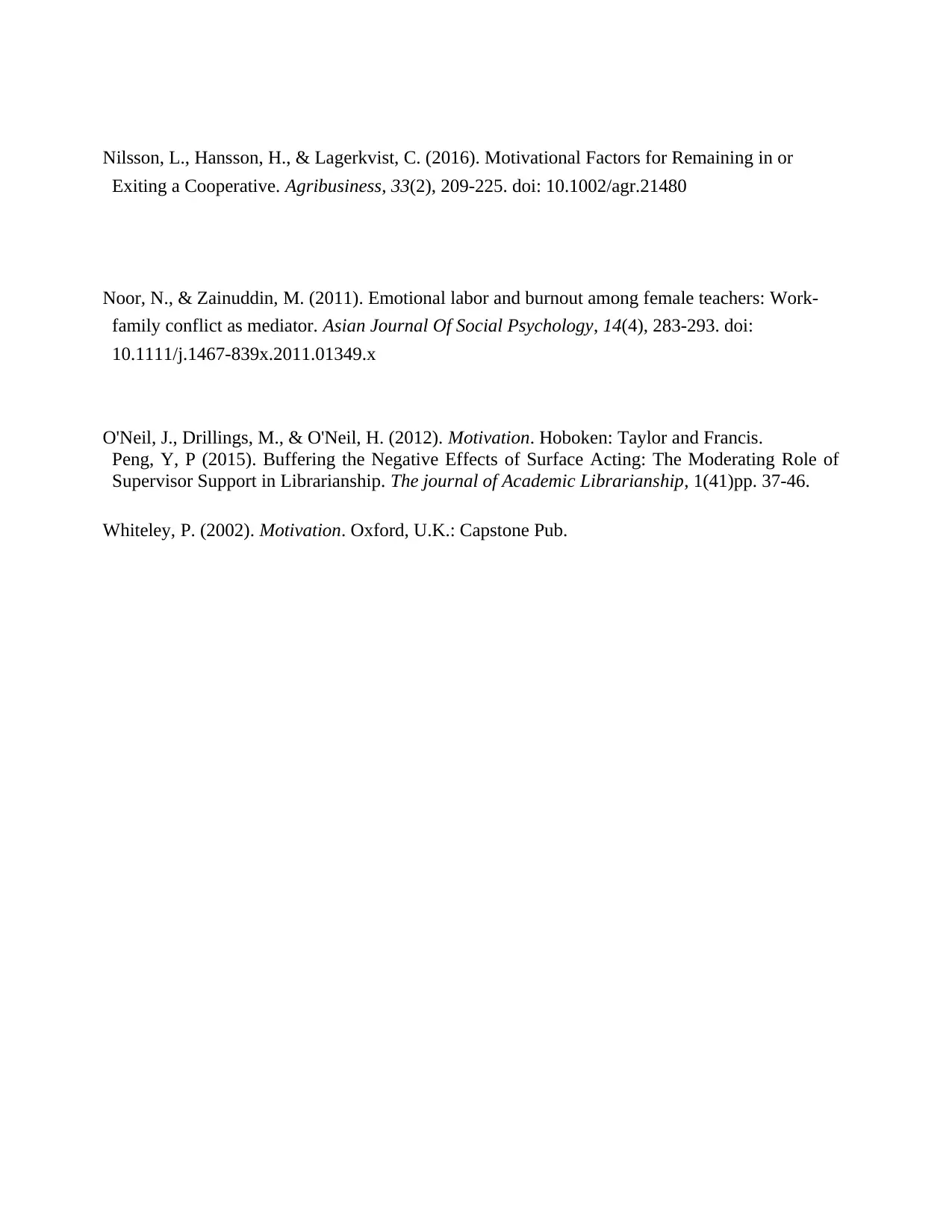
Nilsson, L., Hansson, H., & Lagerkvist, C. (2016). Motivational Factors for Remaining in or
Exiting a Cooperative. Agribusiness, 33(2), 209-225. doi: 10.1002/agr.21480
Noor, N., & Zainuddin, M. (2011). Emotional labor and burnout among female teachers: Work-
family conflict as mediator. Asian Journal Of Social Psychology, 14(4), 283-293. doi:
10.1111/j.1467-839x.2011.01349.x
O'Neil, J., Drillings, M., & O'Neil, H. (2012). Motivation. Hoboken: Taylor and Francis.
Peng, Y, P (2015). Buffering the Negative Effects of Surface Acting: The Moderating Role of
Supervisor Support in Librarianship. The journal of Academic Librarianship, 1(41)pp. 37-46.
Whiteley, P. (2002). Motivation. Oxford, U.K.: Capstone Pub.
Exiting a Cooperative. Agribusiness, 33(2), 209-225. doi: 10.1002/agr.21480
Noor, N., & Zainuddin, M. (2011). Emotional labor and burnout among female teachers: Work-
family conflict as mediator. Asian Journal Of Social Psychology, 14(4), 283-293. doi:
10.1111/j.1467-839x.2011.01349.x
O'Neil, J., Drillings, M., & O'Neil, H. (2012). Motivation. Hoboken: Taylor and Francis.
Peng, Y, P (2015). Buffering the Negative Effects of Surface Acting: The Moderating Role of
Supervisor Support in Librarianship. The journal of Academic Librarianship, 1(41)pp. 37-46.
Whiteley, P. (2002). Motivation. Oxford, U.K.: Capstone Pub.
⊘ This is a preview!⊘
Do you want full access?
Subscribe today to unlock all pages.

Trusted by 1+ million students worldwide
1 out of 12
Related Documents
Your All-in-One AI-Powered Toolkit for Academic Success.
+13062052269
info@desklib.com
Available 24*7 on WhatsApp / Email
![[object Object]](/_next/static/media/star-bottom.7253800d.svg)
Unlock your academic potential
Copyright © 2020–2026 A2Z Services. All Rights Reserved. Developed and managed by ZUCOL.




